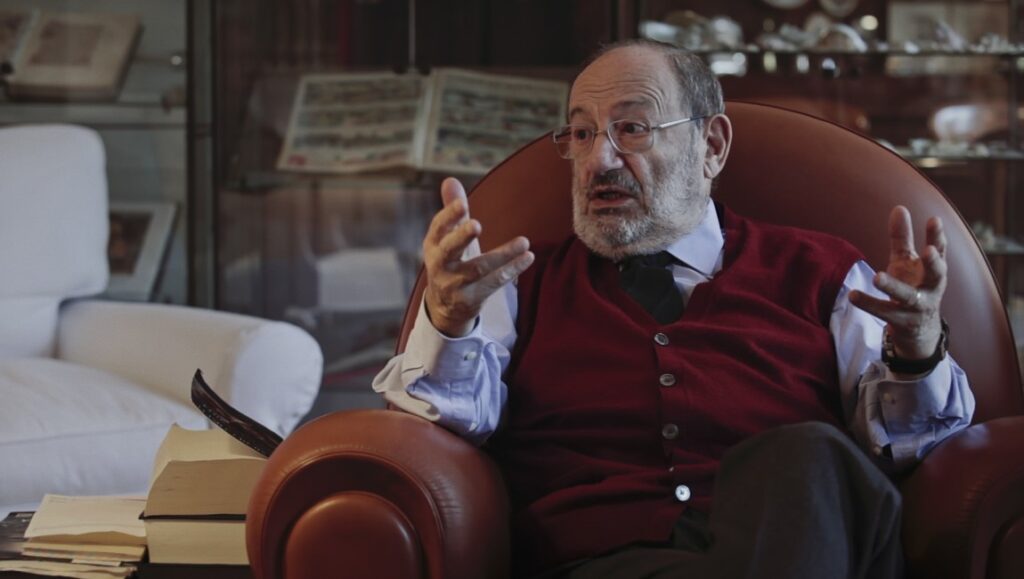In his New York Times review of the English translation (by William Weaver) of The Name of the Rose, Franco Ferrucci described Umberto Eco’s idea of culture as “a channel of interdisciplinary exchange rather than a provider of certainties or a chapel for hermetic and initiatory rites.” Though that may be true, hermetic orders fascinated Eco throughout his life, playing both a major role in that very novel, as well as making up a large part of his personal library. Filmmaker Davide Ferrario once recorded Eco amongst his works — his prized possessions being those works that have been both “proven wrong” and those that promise esoteric wisdom — for a video installation piece in 2015. Shortly after, he died, spawning a slew of remembrances and tender words for the intellectual powerhouse who knew that his big ideas must come in appealing stories and addicting laughter. And, though he is gone, his library of more than 50,000 works remains, representing a life’s work of curiosity and obsession. It’s to this 2015 footage, some of the last recordings of Eco, as well as this vast library, that Ferrario returns in his new Umberto Eco: A Library of the World.
The documentary itself sidesteps a predictable info-bomb format and instead glides through the various preoccupations of Eco’s career. Each section is delivered with whimsical panache, as an actor introduces the context of each of Eco’s highlighted ideas only to be replaced by archival footage of Eco himself mirroring or further explaining these subjects. While Eco’s buoyant presence is addictive and his threads of thoughts are fascinating to follow, a never-ending stream of actors parading through library (both Eco’s and not) aisles, which inevitably cuts back to archival footage (either Italian TV or the equivalent of C-SPAN’s Book TV from the ‘90s) and secondhand stories of Eco courtesy of friends and family shot in cozy and bibliophilic spaces, nevertheless makes the material more suitable for radio programming. There are exceptions, such as the visual accompaniment of dog testicles free-floating in a jar beside Frederik Ruysch’s Thesaurus Anatomicus, a perverse joke considering the morbid contents of the wonderfully illustrated text that Eco’s grandson describes as his childhood fascination. This, and the renderings of Eco’s illustrations for the labyrinths and characters of The Name of the Rose, provides the only visual break from rows and rows of books. Though many potential viewers of a documentary about Umberto Eco would likely jump at the opportunity to look at books — individual, beautifully bound, curiously illustrated books — A Library of the World seems only interested in books as things that are both old and many.
So, although the documentary shies away from a paint-by-numbers talking head format, the filmmaking instincts here are still all-too-familiar. That said, Eco’s words are indeed easy to follow, and his various lectures, both from the aforementioned TV broadcasts and Ferrario’s own footage, are entrancing. Eco does arrive at one topic again and again — an idea that sticks close to the theme of libraries or any sort of organized knowledge. With the invention of the Internet — or perhaps just computers, as it’s their storage capacity and data-retrieval capabilities that end up on Eco’s chopping block — knowledge has simply become too loud and too much for us mere mortals to use. Eco yearns for the days when three books on a topic, certainly not enough to master material, would at least yield a possible way for a human to engage with what he terms our vegetal memory. Eco’s possible three books and your possible three books may yield different recollections on a subject, but your conversation would bear potent fruit. But, an infinite selection of books poses a signal-to-noise problem that Eco was clearly worried about, even in the earliest of the footage used here; it only became worse after his death in 2016. Even more footage shows Eco quoting Borges — another lover of libraries — as he compares Borges’ use of the labyrinth metaphor with our new problems of tome-seeking. And, when this writer tries to learn about, say, film noir, it’s much easier to balk at the sheer number of intro books, classic texts, new (corrected) editions, specialized monographs, Goodreads reviews, book rankings, and meta-conversations than it is to simply pick up whatever’s nearest and actually read it. That one reads and learns anything in our cornucopia of loud, loud information is a bonafide miracle.
Eco also meditates on a Shakespeare-Bacon conspiracy theory, the nature of conspiracy theories themselves, and, perhaps most importantly, the nature of fiction and just how real it is. A short aside about Alexandre Dumas realizing that his fictional characters were mentioned by prison tour guides more often than the real-life figures he based them on shows Eco’s conviction of this case. In this way, despite its formal shortcomings, A Library of the World succeeds in its more humble mission of displaying Eco’s treasured thoughts and arguments. In following his thread about our signal-to-noise problem, Eco quotes from 1 Kings — verses and Vulgate readings about God’s silence in earthquakes and fires — and subsequently praises such holy silence (just as the Greek mystery cults did when they sought holy knowledge). Thankfully, Eco was anything but.
Published as part of InRO Weekly — Volume 1, Issue 26
Enjoy our content? Want early access to features, interviews, and more? Support us on Patreon!


Comments are closed.